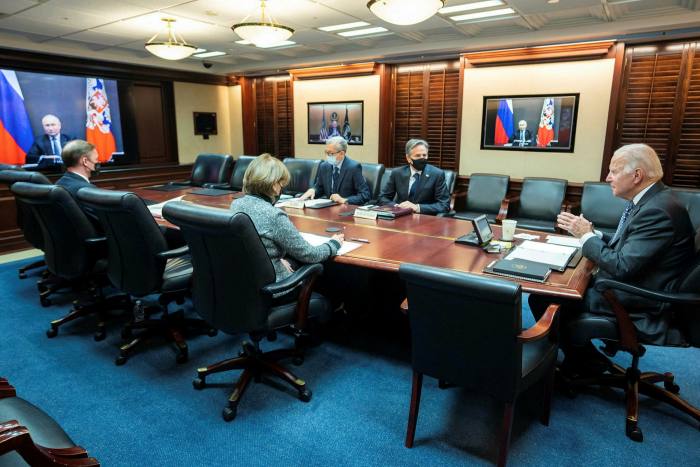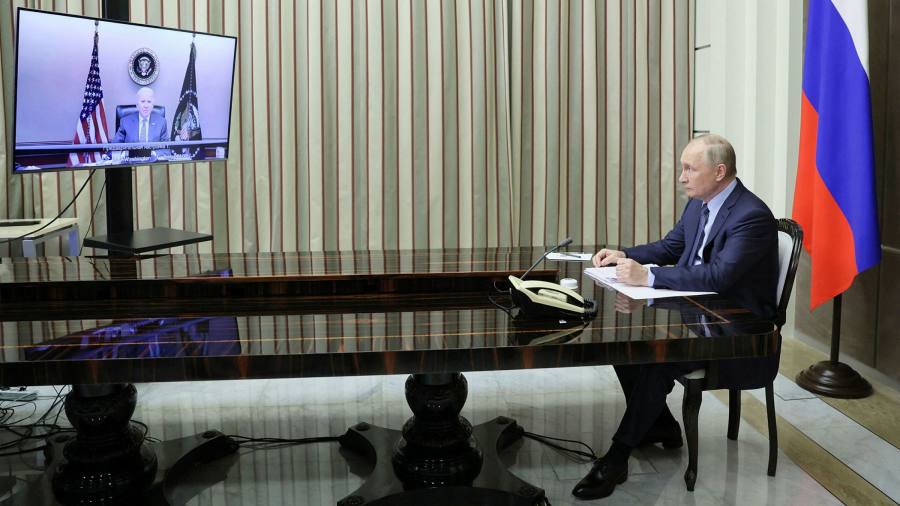The US is putting pressure on Germany to block Russia’s Nord Stream 2 gas pipeline as part of a package of potential sanctions that would be implemented in the event of Vladimir Putin invading Ukraine.
The demand for Berlin and Brussels to prevent the pipeline from becoming operational is part of a sanctions package the US is proposing as it tries to stave off further conflict in the region amid fears in the intelligence community that Putin is preparing for military action.
It comes as US president Joe Biden on Tuesday used a two-hour call with Putin to warn him of “strong economic and other measures” if the Russian leader sent troops into Ukraine.
Threatening Nord Stream 2, which is built but not yet pumping gas, would be included alongside a package being proposed by the US, which would include financial measures such as blocking the conversion of roubles into dollars and further targeting Russian oligarchs, two officials briefed on the plan told the FT.
The move has created tension between Washington and Berlin. “There have been some pretty robust conversations about it,” said one western diplomat. “But ultimately a consensus could emerge that if there is a serious invasion of Ukraine, Nord Stream 2 becomes untenable.”
One US official said the new German government was expected to be “more helpful” to the US pressure campaign against Russia, as the Biden administration tries to win European support for a strong package intended to make Putin wary of the costs of invading Ukraine.
US officials are expected to travel to Germany as soon as the country’s new government, led by chancellor Olaf Scholz, is in place.
“Nord Stream 2 is always an elephant in the room,” said the US official. “It looms large over anything to do with Russia, Germany and Ukraine.”
Putin and Biden have told their teams “to follow up” on the call, according to a White House readout of their conversation, which added that the US would work closely with its allies and partners.
Biden was due to brief leaders of France, Germany, Italy and the UK and, separately, Ukraine president Volodymyr Zelensky following the call on Tuesday. The Kremlin provided no immediate readout of the call.
The US has spent weeks attempting to convince European partners of the risk that Putin might invade Ukraine early next year and secure their backing for an aggressive response to deter him in advance.
It is unclear what type of military escalation would class as an invasion and trigger sanctions.
In 2014, Putin denied that soldiers without insignia who seized the Crimean peninsula from Ukraine were Russian special forces, and continues to insist Moscow is not involved in the separatist war in the country’s east — despite ample evidence to the contrary.
The EU earlier on Tuesday vowed to expand punitive measures against Russia in case of “further aggression”.
Ursula von der Leyen, the European Commission chief, told EU ambassadors the bloc would “respond appropriately to any further aggressions . . . taken against us or our neighbours including Ukraine” and would take “additional restrictive measures” beyond economic sanctions in case of an invasion.
Biden hosted talks with European partners on Monday ahead of the call with Putin so that he could enter the talks with his Russian counterpart with the claim that western allies were unified behind the US stance.

EU sanctions being discussed would focus on ways to target Russia’s economy and financial system, western diplomats told the Financial Times.
Western officials briefed on Washington’s approach said restrictions on converting roubles into western currencies would make Russian oil sales “much more difficult”. They added that such sanctions would “clearly go much further” than reprisals after Russia’s annexation of Crimea.
The US believes Putin is assembling the troops, equipment and disinformation campaign necessary for military escalation next year. A new invasion would reactivate a slow-burning conflict in Donbas, an eastern Ukrainian region on the Russian border, that has claimed more than 14,000 lives.
US intelligence on Russia’s military preparations shared with European states in recent weeks had “created a sense of urgency” around new sanctions, a senior EU official said.
Russia annexed the Crimean peninsula following a pro-western uprising in Kyiv. Since then, the Kremlin has supported separatist forces in the Donbas region, though it denies any direct involvement in the conflict.
Meanwhile Putin has demanded legally binding security guarantees from the west about Russia’s “red lines”, which he described as commitments that Nato would not admit Ukraine to the bloc or deploy troops and weaponry in the country.
Following Moscow’s annexation of Crimea, the US and EU imposed travel bans and asset freezes on Russian government and security officials, and others close to Putin.
The US then added a ban on transactions with some Russian companies and their executives. Western countries also banned some energy and infrastructure-related lending.

